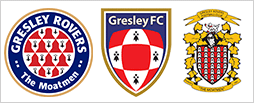Welcome to the Gresley Rovers archive. From here you can find a large amount of information about the club's past.
Some sections contain more information than others, so we may have Fixtures from one season where we don't have News for example.
To find what you're looking for, simply chose a section from below.
Gresley Rovers History
The original Gresley Rovers were formed in 1882 in the small mining village of Church Gresley, which is near to Swadlincote - the biggest town in South Derbyshire.
Their first ground was at Mushroom Lane in Albert Village a mile or so from Church Gresley and they played mainly friendlies and cup games for ten years before joining the Burton Junior League for the 1892/93 season. They won their first league title in the 1894/95 season eleven points clear of their nearest rivals in the Burton Junior League.
Rovers moved from the quaintly named Mushroom Lane ground (which they shared with the local cricket club Mushroom Lane CC) to the newly acquired Church Street Ground in time for the 1895/96 season.
Despite the lack of facilities (the teams changed at the nearby Boot Hotel) they were accepted into the Midland League for the 1903/04 season where they stayed for three seasons. Some of the clubs played are now in the Football League. They struggled in this much higher standard and therefore returned to the local league in 1905 to 'gather their strength' again.
Rovers stayed at Church Street till near the end of the 1907/08 season when they had to move as the land was required for building and moved across the road onto the newly acquired Moat Ground - the ground they still play on today.
Rovers stepped up a couple of grades to join the Central Alliance and then moved up again as they joined the powerful Birmingham Combination in 1925. However, despite reaching the First Round Proper of the F.A. Cup in 1930/31, they experienced financial difficulties, and these forced them to leave the Birmingham Combination and join the more local Central Alliance in 1933.
A couple of seasons later they moved to the Leicestershire Senior League and enjoyed success in the immediate post-war years as they won the title in 1946/7 and 1947/8 and were runners-up in 1948/9. At the start of the fifties the Club made the decision to join the Central Alliance. However, on this occasion, their stay in that League was only brief and they joined the Birmingham & District League in 1954/5. They then rejoined the Central Alliance in 1959/60 and stayed in that League until 1974/5 during which time the League changed its title to the East Midlands Regional League.
Gresley dominated that League and in the fourteen seasons from 1961 to 1975 the lowest they finished was in fifth place as they won the title on four occasions, finished runners-up on four occasions, ended in third place on three occasions, fourth on two occasions and fifth only once. At the start of the 1975/6, they moved to the West Midlands League, which was a much stronger League, and in the early years they always ended in the lower regions of the table. However, after much hard work off the field, runners-up spot was achieved in 1985/6 and the following six seasons saw Gresley finish 4th, 4th, 2nd, 3rd, lst and 1st. During that period they also won the Derbyshire Senior Cup on four successive occasions. Season 1990/91 was a particularly good one for Gresley. In addition to the League Title and the Derbyshire Senior Cup win they also reached the final of the F.A. Vase and so had the honour of playing at Wembley. Their opponents were Guiseley and some National Newspapers reported it as 'the most exciting Wembley Cup Final ever'. When one looks at the goals sequence one can see how the game earned that accolade: After 31 minutes the score was Guiseley - 3 Gresley - 0, but Gresley came back and grabbed a very dramatic equaliser in injury time at the end of the ninety minutes. Then in extra time Gresley went 4 - 3 in front but this time Guiseley scored a very dramatic equaliser as they levelled things in injury time at the end of the second half of extra time.
The replay at Bramall Lane saw Gresley lose by 3 - 1. However, despite that tremendous season their application to join the Beazer Homes League was not successful but they battled on to win the league again the following season. This time their application to the Beazer Homes League was successful and they were placed in the Midland Division for the 1992/3 season. That 1992/3 season had some disappointment for Gresley as they lost in the semi-final of the F.A. Vase and so narrowly missed another trip to Wembley, but in the League they confounded everyone by finishing as runners- up and so gained promotion to the Premier Division at the first attempt. The 1993/4 season saw them consolidate in 14th position but medals did come to the Club as they again won the Derbyshire Senior Cup and reached the Final of the Dr. Martens League Cup. An improved League position of 8th was achieved in 1994/5 and that season saw them reaching the First Round Proper of the F.A. Cup for only the second time ever before losing away to Crewe.
Paul Futcher was appointed manager with Garry Birtles, former England International, his assistant on 2nd November 1995. Rovers improved their League position yet again in 1995/6 as they ended the season in 5th place and had the bonus of winning the Derbyshire Senior Cup yet again.
The season 1996/7 was the best in the Club's long history because in addition to retaining the Derbyshire Senior Cup they also won the Dr. Martens Premier Division championship. Rovers were unbeaten in their first seventeen league games (won 10 drawn 7) and were league leaders for 31 weeks.
The title was finally won with a 3 - 1 home victory against Gloucester City at the Moat Ground on April 26th 1997. Gresley Rovers became the first Derbyshire side and first village side to win this prestigious trophy, but ground grading meant that they were unable to gain promotion to the Football Conference.
Paul Futcher the Manager during that campaign left during the close season and his Assistant Manager Garry Birtles stepped up into the Manager's position. The disappointment of not being promoted to the Football Conference saw many of Gresley's players leave the club. The 1997/8 season saw Gresley finish in the bottom half of the Dr. Martens Premier League.
The 1998/99 season will go down in the history of Gresley Rovers as one of the worst. At the end of 1998 they were in the top six. By the end of April, they were relegated. The season started well and 13 points from their September games saw them in third place just four points adrift of the leaders Nuneaton Borough. In November Gresley Rovers were drawn to meet Walsall at the Bescot Stadium in the first round of the F.A. Cup. Gresley went close to causing an upset but were denied at least a replay by a goal 11 minutes from the end. Victories over Kings Lynn and Hastings got December off to a fine start; however, three defeats saw them drop to 6th place. After a disastrous run of 6 successive defeats in January saw them slump to 17th place just 5 points above the relegation places. In February two successive draws and three defeats proved to be Garry Birtles downfall and he and his assistant, Paul Fitzpatrick were dismissed. Stuart Ford took charge temporarily and saw the team beat Atherstone 2-1 that ended a run of 14 games without a win. In March 1999 Brian Kenning was appointed manager. The opening game of April produced a comfortable 3-0 victory over Cambridge City. But three defeats followed against Nuneaton, Crawley, and Rothwell. Vital game at Dorchester and Salisbury yielded only one point. The defeat on the final day against Bath City pushed Gresley into the Midlands Division just two years after winning the Dr. Martens Premier Division Championship by 11 points. The last time Gresley were relegated was in the 1958/9 season when they went down from the Birmingham League Division one to Division two.
After financial difficulties, Gresley Rovers liquidated at the end of the 2008–09 season, forming a new football club, Gresley FC.
Gresley FC
Gresley FC was formed in 2009 and enjoyed a very successful first season in the East Midlands Counties League. The side, managed by Gary Norton, finished as runners up and therefore narrowly missed out on promotion. Gresley also enjoyed a long run in the FA Vase by beating Spennymoor, Dawlish and Long Buckby. The Dawlish tie in particular will live long in the memory as the original tie was abandoned in extra time and the Moatmen won the replay in South Derbyshire on penalties. The Vase run came to an end in front of the home fans in disappointing fashion at home to Whitehawk in the quarter-finals.
New Directors joined the club looking to turn the dream of moving to a new stadium into a reality.
Manager Gary Norton and his assistant Martin Rowe invited Martyn Rowntree to step up from the reserves to become first team coach.
2010-2011 Gresley's second season as a club and also their second in the East Midlands Counties League saw another good FA Vase run getting to the last 32 and then going one step further from the previous season by winning the league after an exciting run-in. Being a few points behind the leading contenders Gresley could not afford to slip up again after an unexpected home defeat in early January if their dreams were to be realised. An amazing 20 game unbeaten run with the final 8 all victories saw Gresley crowned as champions and promoted into the Midland Football Alliance.
Season 2011-2012 saw another good run in the FA Vase reaching the last 16 and to top off a superb season Gresley achieved a remarkable back-to-back title success as they lifted the Midland Football Alliance title at their first attempt and promotion to the Evo-Stik NPL Division One South. The first season back at level four was successful as Gresley settled into the Division One South. Gresley finished just outside the top ten in the league and reached the 3rd Qualifying round of the FA Cup. At the end of the season joint manager Gary Norton stepped down with Martin Rowe named as manager.
After losing their first two league fixtures of 2013-2014 and then an indifferent spell up to Christmas Gresley managed to stabilise their performances and ended the season in a creditable 9th place. However, in both the FA Cup and FA Trophy Gresley had good runs going out of the cup after forcing Conference South outfit Brackley Town to a replay after a good draw at St James Park in the 2nd Qualifying Round and in the Trophy they took Conference Premier side Wrexham almost all the way in the First Round Proper losing by the odd goal in three at the Racecourse Ground. In September 2014 Martin Rowe resigned and his assistant Wayne Thornhill was appointed as first team manager at the end of October.
Wayne, along with his assistants Jamie Barrett and Russell Peel, turned the season around and they finished in a creditable fifth place making the play-offs where they met Leek Town at Harrison Park who narrowly beat the Moatmen by a single goal. An appearance in the Derbyshire Senior Cup Final at the home of Chesterfield FC ended with Gresley as runners-up losing to Evo-Stik Premier side Matlock Town. At the beginning of September Wayne stepped down and Dave Langston appointed as caretaker manager. In October Scott Goodwin was appointed as manager with Jamie Barrett and Gary Rickets as his assistants. After a disappointing run of defeats Scott was released and Gary Ricketts appointed as player/manager assisted by Jamie Barrett and Dave Langston. The 2015-2016 ended with Gresley in a disappointing 16th position. Ricketts stood down as manager and former Leicester Nirvana manager Damion Beckford-Quailey appointed in the close season. Damion’s first season started well but the loss of three key players around Christmas time saw his side struggle for the rest of the campaign finishing in 18th position.
His second season, 2017-2018 was not much better but it ended in a disappointing manner when the manager, management team and most of the players left the club with just four games remaining and the danger of being relegated. Former Moat boss Gary Norton stepped in to steer the club to the end of a trying season and using a mixture of reserve and youth team players managed to keep the club in step 4 finishing 17th. Norton agreed to take on the role of manager for season 2018-2019 and along with assistant Carl Slater and player/coach Jamie Barrett have started to rebuild a side that hopefully be more competitive than the last two seasons.
Early in January 2019 Norton stood down and Gavin Hurren was appointed as manager. Unfortunately, at the end of the season, Gresley were relegated from the Evo-Stik East to the Midland League. Hurren left early in the new season to be replaced by David McDermott.
Gresley’s results failed to improve and in February McDermott was relieved of his position. Former manager Gary Norton again stepped in to steer the ship until the end of the season.
Gresley Rovers Return
During the summer of 2020, the Gresley FC board met to discuss the possibility of re-naming the club and a unanimous decision saw the Gresley Rovers name return to non-league football. Joint managers of Carl Abbott, Gary Norton and assistant manager Paul Thomlinson will now have the job of recruiting their players after the previous season was curtailed due to the Covid-19 pandemic and non-league football allowed to start again.
Gresley FC Club Badge
 After the demise of the former club Gresley Rovers a new club Gresley FC was formed and so a new club badge was commissioned.
After the demise of the former club Gresley Rovers a new club Gresley FC was formed and so a new club badge was commissioned.
The club wanted to keep some of the elements of the previous badge and so the new one was also based on the Gresley family coat of arms. The Gresley family were Lords of the Manor and can be traced back to at least the 12th Century.
The Gresley Arms are described as "Vaire, ermine and gules" (i.e. silver and red) and possibly came into use during the last quarter of the 12th century.
The village of Gresley is in South Derbyshire and the local District Council also have the red and white device in their coat of arms.
Although keeping the red & white (silver) elements of the arms the new club badge was 'modernised' and the club name placed on a blue background to illustrate the new origins of Gresley Football Club.
The red segments represent the red robes worn by a Lord on State occasions and the white segments represent the ermine (the winter coat of a stoat) trim on the robe and in heraldry the black symbols on the white represent the black ermine tails which were inserted into the white fur.
With the return of Gresley Rovers the decision was made not to return to the old badge as the club did not want to look back but to continue to look forward. Building on the Gresley FC badge part it of it was retained. You will see the red and white segments are there which are part of the Gresley family arms with the blue remaining from the Gresley FC badge to continue to mark the fresh outlook of the club. The famous old name of Gresley Rovers returns and the nickname 'The Moatmen' added.





